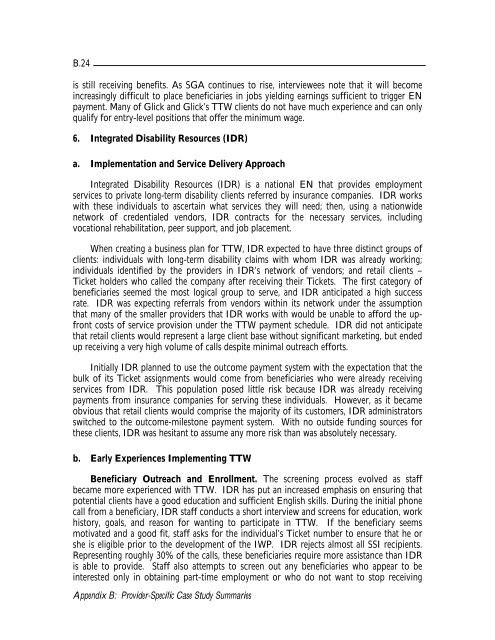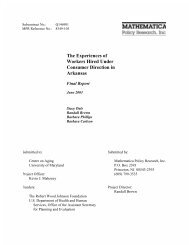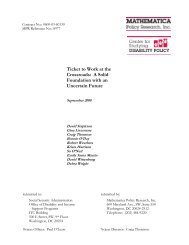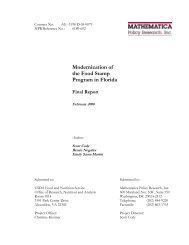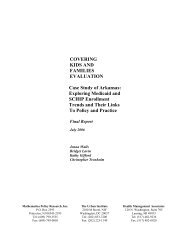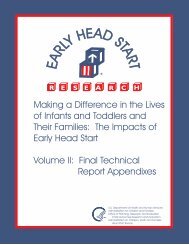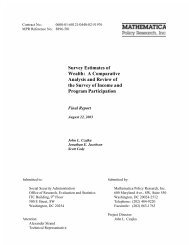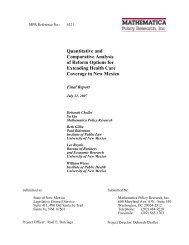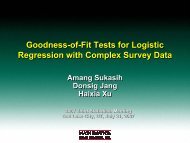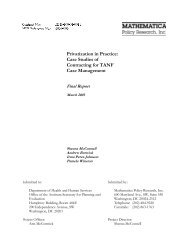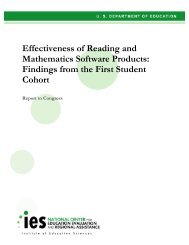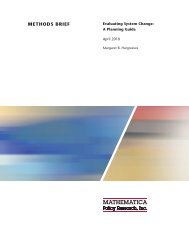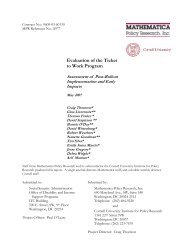Evaluation of the Ticket to Work Program Initial Evaluation Report
Evaluation of the Ticket to Work Program Initial Evaluation Report
Evaluation of the Ticket to Work Program Initial Evaluation Report
You also want an ePaper? Increase the reach of your titles
YUMPU automatically turns print PDFs into web optimized ePapers that Google loves.
B.24<br />
is still receiving benefits. As SGA continues <strong>to</strong> rise, interviewees note that it will become<br />
increasingly difficult <strong>to</strong> place beneficiaries in jobs yielding earnings sufficient <strong>to</strong> trigger EN<br />
payment. Many <strong>of</strong> Glick and Glick’s TTW clients do not have much experience and can only<br />
qualify for entry-level positions that <strong>of</strong>fer <strong>the</strong> minimum wage.<br />
6. Integrated Disability Resources (IDR)<br />
a. Implementation and Service Delivery Approach<br />
Integrated Disability Resources (IDR) is a national EN that provides employment<br />
services <strong>to</strong> private long-term disability clients referred by insurance companies. IDR works<br />
with <strong>the</strong>se individuals <strong>to</strong> ascertain what services <strong>the</strong>y will need; <strong>the</strong>n, using a nationwide<br />
network <strong>of</strong> credentialed vendors, IDR contracts for <strong>the</strong> necessary services, including<br />
vocational rehabilitation, peer support, and job placement.<br />
When creating a business plan for TTW, IDR expected <strong>to</strong> have three distinct groups <strong>of</strong><br />
clients: individuals with long-term disability claims with whom IDR was already working;<br />
individuals identified by <strong>the</strong> providers in IDR’s network <strong>of</strong> vendors; and retail clients –<br />
<strong>Ticket</strong> holders who called <strong>the</strong> company after receiving <strong>the</strong>ir <strong>Ticket</strong>s. The first category <strong>of</strong><br />
beneficiaries seemed <strong>the</strong> most logical group <strong>to</strong> serve, and IDR anticipated a high success<br />
rate. IDR was expecting referrals from vendors within its network under <strong>the</strong> assumption<br />
that many <strong>of</strong> <strong>the</strong> smaller providers that IDR works with would be unable <strong>to</strong> afford <strong>the</strong> upfront<br />
costs <strong>of</strong> service provision under <strong>the</strong> TTW payment schedule. IDR did not anticipate<br />
that retail clients would represent a large client base without significant marketing, but ended<br />
up receiving a very high volume <strong>of</strong> calls despite minimal outreach efforts.<br />
<strong>Initial</strong>ly IDR planned <strong>to</strong> use <strong>the</strong> outcome payment system with <strong>the</strong> expectation that <strong>the</strong><br />
bulk <strong>of</strong> its <strong>Ticket</strong> assignments would come from beneficiaries who were already receiving<br />
services from IDR. This population posed little risk because IDR was already receiving<br />
payments from insurance companies for serving <strong>the</strong>se individuals. However, as it became<br />
obvious that retail clients would comprise <strong>the</strong> majority <strong>of</strong> its cus<strong>to</strong>mers, IDR administra<strong>to</strong>rs<br />
switched <strong>to</strong> <strong>the</strong> outcome-miles<strong>to</strong>ne payment system. With no outside funding sources for<br />
<strong>the</strong>se clients, IDR was hesitant <strong>to</strong> assume any more risk than was absolutely necessary.<br />
b. Early Experiences Implementing TTW<br />
Beneficiary Outreach and Enrollment. The screening process evolved as staff<br />
became more experienced with TTW. IDR has put an increased emphasis on ensuring that<br />
potential clients have a good education and sufficient English skills. During <strong>the</strong> initial phone<br />
call from a beneficiary, IDR staff conducts a short interview and screens for education, work<br />
his<strong>to</strong>ry, goals, and reason for wanting <strong>to</strong> participate in TTW. If <strong>the</strong> beneficiary seems<br />
motivated and a good fit, staff asks for <strong>the</strong> individual’s <strong>Ticket</strong> number <strong>to</strong> ensure that he or<br />
she is eligible prior <strong>to</strong> <strong>the</strong> development <strong>of</strong> <strong>the</strong> IWP. IDR rejects almost all SSI recipients.<br />
Representing roughly 30% <strong>of</strong> <strong>the</strong> calls, <strong>the</strong>se beneficiaries require more assistance than IDR<br />
is able <strong>to</strong> provide. Staff also attempts <strong>to</strong> screen out any beneficiaries who appear <strong>to</strong> be<br />
interested only in obtaining part-time employment or who do not want <strong>to</strong> s<strong>to</strong>p receiving<br />
Appendix B: Provider-Specific Case Study Summaries


